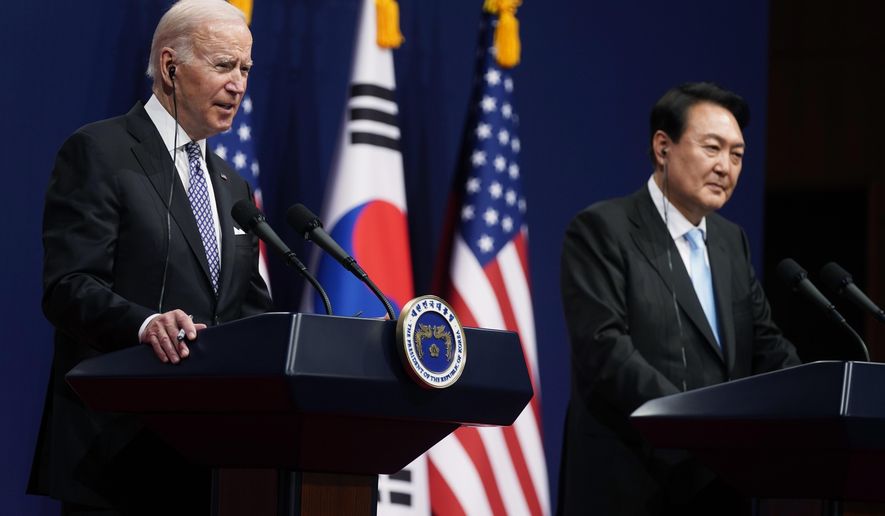OPINION:
“A time-tested alliance.” Those words really sum up the seven-decade partnership between the United States and the Republic of Korea. Though culturally different, the two nations share the same values. Seoul has proved a trustworthy and capable partner, both in terms of national security and commercial dealings. Yet much more can and should be done.
This year marks the 70th anniversary of the alliance. President Biden has invited South Korean President Yoon Suk-yeol to make an official state visit, the highest expression of a solid diplomatic relationship. On April 26, Mr. Yoon is set to arrive in Washington to commemorate the landmark anniversary.
Not yet one year into his presidency, Mr. Yoon has spoken frequently of the importance of freedom. He has also underscored the importance of the South Korea-U.S. alliance, calling the relationship “the foundation” of freedom. While visiting Seoul last May, Mr. Biden echoed that sentiment and praised the relationship as reaching “new heights.”
Indeed, anchored in the 1953 Mutual Defense Treaty, the U.S.-South Korea partnership stands as one of the most accomplished bilateral relationships built by America since the end of World War II.
Once a recipient of U.S. foreign aid, South Korea has become one of the most competitive economies in the world. Along the way, it transformed itself from a security consumer to competent partner in providing security to other nations.
Beyond mutual security interests, the partnership is rooted in people-to-people ties and commercial cooperation led by global companies in both countries.
Clearly, the alliance has been fulfilling its promises. Yet unique ways to broaden the partnership remain untapped. It is in the clear interest of both Washington and Seoul to elevate their partnership to the next level through greater strategic clarity and practical engagement. The April 26 state visit is a perfect opportunity to get the ball rolling.
For example, strategic and timely opportunities abound for South Korea to strengthen ties with NATO, facilitated by the United States. It’s certainly in the interest of Washington to foster greater interaction and cooperation between its vital Indo-Pacific partners and its key trans-Atlantic allies.
To this end, U.S. officials should start advocating for Mr. Yoon to be invited to the July 11-12 NATO summit in Vilnius, Lithuania.
South Korea — and our European allies — would also benefit from Seoul developing a closer relationship with countries in central and eastern Europe. The Three Seas Initiative, or 3SI, would be a practical avenue for greater economic cooperation and infrastructure development.
Launched in 2016, the 3SI seeks to develop a north-south, east-west commercial corridor linking 12 European Union countries around and between the Baltic, Black and Adriatic seas. South Korea could be a huge help to the efforts of the U.S. and the 3SI countries to put the connectivity initiative into further operation.
As mentioned earlier, South Korea has become one of the world’s leading free market democracies. Recognizing that, it’s high time for Washington to push to give Seoul a seat in the Group of 7. All G-7 countries are democracies and close U.S. treaty allies. Seoul certainly satisfies the membership criteria. With Russia and China increasingly threatening the world’s free market democracies, it’s only prudent to bring another hand on board the G-7.
Throughout many trying and difficult times over the past seven decades, South Korea has demonstrated its willingness and resilient capacity to work with the U.S. toward shared goals. Now is the time for Washington and Seoul to act on that steadfastness and notch up the pivotal partnership to a next era.
The April 26 state visit need not be just a ceremonial event. It can be a substantive success if Washington takes the steps recommended above to renew and elevate the bilateral partnership to a new level of global engagement.
• Anthony Kim is manager of global engagement at The Heritage Foundation’s Thatcher Center for Freedom and editor of the think tank’s annual Index of Economic Freedom.




Please read our comment policy before commenting.